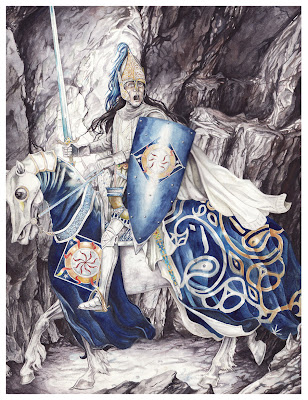
Then suddenly there was a rock-wall before them, flat-faced and sheer, forty feet high, maybe, but dusk dimmed the sky above them and guess was uncertain.
'Is this the door of your house?' said Turin. 'Dwarves love stone, it is said.' He drew close to Mim, lest he should play them some trick at the last.
'Not the door of the house, but the gate of the garth,' said Mim. Then he turned to the right along the cliff-foot, and after twenty paces he halted suddenly; and Turin saw that by the work of hands or of weather there was a cleft so shaped that two faces of the wall overlapped, and an opening ran back to the left between them. Its entrance was shrouded by long trailing plants rooted in crevices above, but within there was a steep stony path going upward in the dark. Water trickled down it, and it was dank.
One by one they filed up. At the top the path turned right and south again, and brought them through a thicket of thorns out upon a green flat, through which it ran on into the shadows. They had come to Mim's house, Bar-en-Nibin-noeg, which only ancient tales in Doriath and Nar-gothrond remembered, and no Men had seen. But night was falling, and the east was starlit, and they could not yet see how this strange place was shaped.
Amon Rudh had a crown: a great mass like a steep cap of stone with a bare flattened top. Upon its north side there stood out from it a shelf, level and almost square, which could not be seen from below; for behind it stood the hill-crown like a wall, and west and east from its brink sheer cliffs fell. Only from the north, as they had come, could it be reached with ease by those who knew the way.
J.R.R. Tolkien
The Children of Húrin
Chapter VII - 'Of Mîm the Dwarf'
[Image: Ted Nasmith]





















